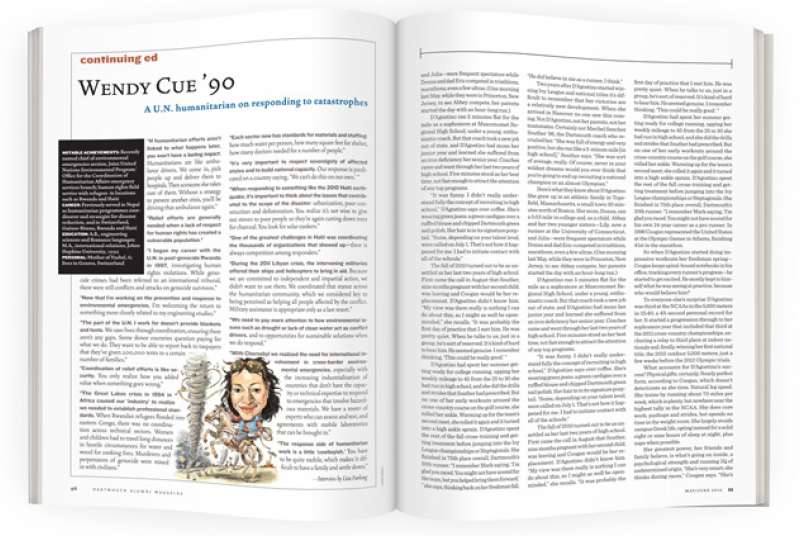
Wendy Cue ’90
Notable Achievements: Recently named chief of environmental emergencies section, Joint United Nations Environmental Program/Office for the Coordination of Humanitarian Affairs emergency services branch; human rights field service with refugees in locations such as Rwanda and Haiti
Career: Previously served in Nepal as humanitarian programmes coordinator and strategist for disaster reduction, and in Switzerland, Guinea-Bissau, Rwanda and Haiti
Education: A.B., engineering sciences and Romance languages; M.A., international relations, Johns Hopkins University, 1992
Personal: Mother of Yzabel, 6; lives in Geneva, Switzerland
“If humanitarian efforts aren’t linked to what happens later, you won’t have a lasting impact. Humanitarians are like ambulance drivers. We come in, pick people up and deliver them to hospitals. Then someone else takes care of them. Without a strategy to prevent another crisis, you’ll be driving that ambulance again.”
“Relief efforts are generally needed when a lack of respect for human rights has created a vulnerable population.”
“I began my career with the U.N. in post-genocide Rwanda in 1997, investigating human rights violations. While genocide crimes had been referred to an international tribunal, there were still conflicts and attacks on genocide survivors.”
“Now that I’m working on the prevention and response to environmental emergencies, I’m welcoming the return to something more closely related to my engineering studies.”
“The part of the U.N. I work for doesn’t provide blankets and tents. We save lives through coordination, ensuring there aren’t any gaps. Some donor countries question paying for what we do. They want to be able to report back to taxpayers that they’ve given 200,000 tents to a certain number of families.”
“Coordination of relief efforts is like security. You only realize how you added value when something goes wrong.”
“The Great Lakes crisis in 1994 in Africa caused our ‘industry’ to realize we needed to establish professional standards. When Rwandan refugees flooded into eastern Congo, there was no coordination across technical sectors. Women and children had to travel long distances in hostile circumstances for water and wood for cooking fires. Murderers and perpetrators of genocide were mixed in with civilians.”
“Each sector now has standards for materials and staffing: how much water per person, how many square feet for shelter, how many doctors needed for x number of people.”
“It’s very important to respect sovereignty of affected states and to build national capacity. Our response is predicated on a country saying, ‘We can’t do this on our own.’ ”
“When responding to something like the 2010 Haiti earthquake, it’s important to think about the issues that contributed to the scope of the disaster: urbanization, poor construction and deforestation. You realize it’s not wise to give out stoves to poor people so they’re again cutting down trees for charcoal. You look for solar cookers.”
“One of the greatest challenges in Haiti was coordinating the thousands of organizations that showed up—there is always competition among responders.”
“During the 2011 Libyan crisis, the intervening militaries offered their ships and helicopters to bring in aid. Because we are committed to independent and impartial action, we didn’t want to use them. We coordinated that stance across the humanitarian community, which we considered key to being perceived as helping all people affected by the conflict. Military assistance is appropriate only as a last resort.”
“We need to pay more attention to how environmental issues such as drought or lack of clean water act as conflict drivers, and to opportunities for sustainable solutions when we do respond.”
“With Chernobyl we realized the need for international involvement in cross-border environmental emergencies, especially with the increasing industrialization of countries that don’t have the capacity or technical expertise to respond to emergencies that involve hazardous materials. We have a roster of experts who can assess and test, and agreements with mobile laboratories that can be brought in.”
“The response side of humanitarian work is a little ‘cowboyish.’ You have to be quite mobile, which makes it difficult to have a family and settle down.”










